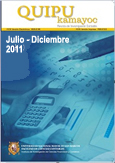SOVEREIGN CRISIS: PRELUDE TO A NEW GLOBAL CRISIS
DOI:
https://doi.org/10.15381/quipu.v19i36.6501Keywords:
Crisis soberana, PBI global, déficit fiscal, Deuda pública, bonos soberanos.Abstract
A new crisis is looming, and perhaps more strongly to the experience in 2008, which as is well known scenes of panic believe in global stock markets and declines in the real sector of the economy, the effects remain latent in many economies Euro and North America. The crisis now emanating from the fiscal imbalances, especially those countries that have failed to intelligently manage their fiscal accounts as a result of this, some are already on the verge of insolvency, as is Greece in the Euro Zone. In the same way there are other economies such as Italy and why not also say U.S. countries that have been punished with lower grades for their compliance credits. these results, given the globalization of markets will not stay there but that play consistently to other economic areas such as the Americas, including Peru, as no kind of economy could argue that you can be immune when crises occur this type, called a sovereign crisis. To worsen the debt crisis, the effects will be highly detrimental to the economy, so governments warrants redesign their global public policy to keep its fiscal accounts and total economic stability.
Downloads
Downloads
Published
Issue
Section
License
Copyright (c) 2011 Nicko Alberto Gomero Gonzales, Eduardo Alberto Montes Farro

This work is licensed under a Creative Commons Attribution-NonCommercial-ShareAlike 4.0 International License.
AUTHORS RETAIN THEIR RIGHTS:
a. Authors retain their trade mark rights and patent, and also on any process or procedure described in the article.
b. Authors retain their right to share, copy, distribute, perform and publicly communicate their article (eg, to place their article in an institutional repository or publish it in a book), with an acknowledgment of its initial publication in Quipukamayoc .
c. Authors retain theirs right to make a subsequent publication of their work, to use the article or any part thereof (eg a compilation of his papers, lecture notes, thesis, or a book), always indicating the source of publication (the originator of the work, journal, volume, number and date).






